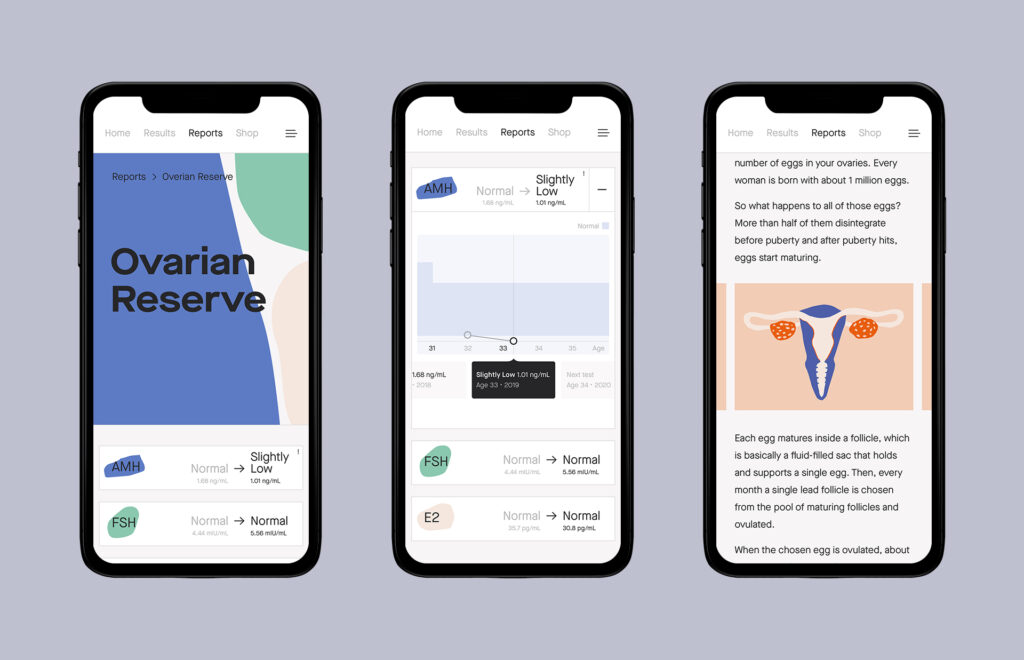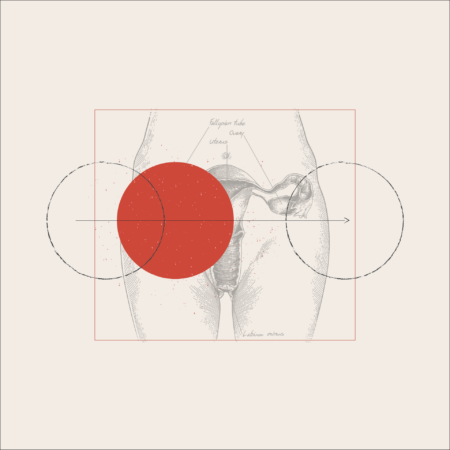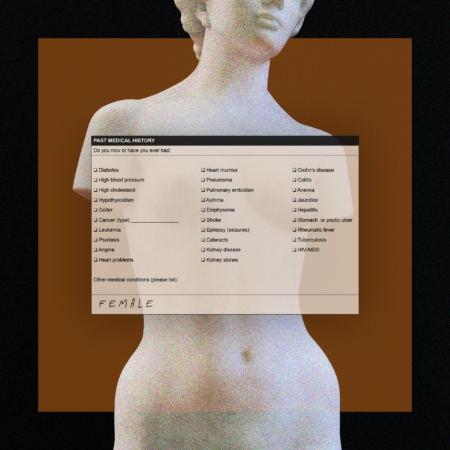You could say that Afton Vechery is a born businesswoman. Her introduction to the whole “entrepreneurship space” started out of a science fair project in high school, where, at age 13, she won an international tournament after uncovering hundreds of contaminated water wells in her hometown—using her own petri dish—and witnessed a panel of Nobel Laureates discuss their discoveries. “I don’t think I even knew the word ‘entrepreneurship’ back then,” says the co-founder and CEO of Modern Fertility, a reproductive health company that allows women to test their own egg reserve and ovulation hormone levels at home. “It was just—you see a problem, and you feel compelled to do something about it.”
The problem that Vechery, now 31, has set out to solve is the $2 billion women’s fertility industry—specifically, the gap in how our healthcare system thinks about fertility and preconception care. “The system is focused on preventing pregnancy; we don’t have a system that supports actively planning for it,” says Vechery, who launched Modern Fertility in 2017. “With more women waiting until later in life to start their families—a trend that’s not going to reverse—infertility rates are going to continue to rise; we have to focus on an upfront solution. That’s exactly where Modern Fertility is starting.”
The prize for Vechery’s science fair win was a scholarship to college (she double majored in neuroscience and business at Wake Forest University) where, instead of attending frat parties or showing up to class in sweats, Vechery founded a health tech company that built the first application of keratin to regenerate human hair, won a global business competition in Istanbul, performed research in Nairobi and Beirut, and… ran the university’s Entrepreneurship Society. “I guess I was more obsessed with the entrepreneurial journey than others,” Vechery laughs.
Her path to co-founder couldn’t have been clearer. Post college, Vechery took a job as an analyst at a healthcare-focused private equity firm and hedge fund, where she identified health sectors with the potential for growth. “I was the only female at the fund and, coincidentally, really passionate about women’s health. I started learning about fertility, [which] was very, very attractive from a private-equity perspective. Women and families would pay out-of-pocket for these services, and they were very high margin,” she says. (The average cost of IVF, for example, is $25,000 per cycle.) “[But] the part that really stuck with me was the emotional aspect.”

Modern Fertility is a reproductive health company that allows women to test their own egg reserve and ovulation hormone levels at home.
Vechery left the finance world in 2013 and started spending shorter-term stints at early-stage health companies, “where I would be one of the first five employees and be a part of a team that was taking something from zero to one”. Finally, she settled into 23andMe, where she led a product team, rebuilt the customer experience, and helped develop and launch several new products to market. All the while, she had fertility in the back of her mind.
While at 23andMe, then 27-year-old Vechery acknowledged she wouldn’t be starting a family for several more years, but she wanted to check her reproductive health before making that decision. Her ob-gyn denied her the tests, which insurance wouldn’t cover. “They said, ‘No, you’re not actively trying and failing [to get pregnant]. Come back to us when you’re failing for at least 12 months,” she remembers. That stigmatizing language—“failing”—stuck with her. “When infertility feels like a personal failure, it’s a sign of a failure in education. There is no shame in our biology, and clinical information can illuminate this for us.” Vechery ended up at a clinic where she paid $1,500 out-of-pocket for blood tests measuring her reproductive hormones, leading her, inadvertently, to a diagnosis of Polycystic Ovarian Syndrome (PCOS), a cause of infertility that affects one in 10 women. “I always thought I had an irregular cycle because I was super stressed all the time. But when I finally got those results back and I had that important conversation with myself, my partner, and my doctor, it was just so empowering.”
In 2016, she quit her job without a specific plan or company in mind—just a gut feeling that she wanted to change the fertility space. She leaned into the business, shadowing doctors at clinics and listening to other women’s experiences. “I was doing a lot of deep research into every product, tool, and service that existed, to really understand how we can make the most change in the space and develop the strongest type of company,” Vechery explains. Her goal: figure out how to change the constraints of fertility testing that, for decades, had been a luxury for a relatively select few families who could afford expensive services after years of disappointment. “I was trying to understand people with ovaries and how they make decisions. What’s the deal with egg freezing? It was really this deep analysis of every sector in the space and all of the incentives at play.”
Vechery funded all this research herself with four years’ worth of savings, including a full clinical study that demonstrated a finger prick could be used interchangeably with a traditional blood draw. “I would not necessarily recommend this to anyone, but I put all of my money, all of my savings, into Modern Fertility,” she admits. “I was fortunate in that I started Modern Fertility after having a career for a handful of years, before deciding to quit with no income. I had been saving quite a bit and I did not lead the most expensive lifestyle.” The study results were published with the American Academy for Obstetrics and Gynecology and presented to the American Society for Reproductive Medicine, which paved the way for developing her core product, a $159 comprehensive fertility blood test that can be taken with a finger prick at home.
We’re inspiring a fundamental shift in behavior, encouraging women to check their fertility long before society says you should.
The test measures seven hormones, such as prolactin (which stimulates milk production), follicle-stimulating hormone (which manages menstruation and stimulates the growth of eggs), and crucially, anti-mullerian hormone or AMH (which can indicate a woman’s remaining egg reserve). The results, which are reviewed by Modern Fertility physicians before they’re given to customers, can flag thyroid issues, suggest an outcome for egg-freezing or IVF, and project a timeline for menopause. Vechery is moved by the immediate answers to both acute problems, like her own PCOS, and the ability to plan decades into the future. “We should be thinking about our fertility in the same way that we think about our finances or the next step in our career—thinking ahead and planning for what’s next. Why is our reproductive health something that we’ve left entirely to chance?” she says.
In Vechery’s vision, it’s not a one-time test. “We know that AMH, the hormone that indicates ovarian reserve, is more valuable when tested over time, which is why we designed Modern Fertility to support annual hormone check-ins,” Vechery says. “Just like we have different metabolisms that decline over time in different ways, we have different fertility timelines that decline at different rates. It’s key that we check our unique fertility curve every year, so we can get a sense of how steep the decline is. For example, I have PCOS and a high level of AMH, so that means I have a solid amount of eggs—but that number will have to decline by the time I’m in my 40s before menopause, so it’s possible my decline will be more steep and fast than others, even though I’m starting from a higher level. It’s something to keep an eye on!”
With the successful study behind her, Vechery began searching for a cofounder. “I did ‘founder dating,’ where I would actually pay people out of pocket to work with me, to make it serious. If this was something that both of us were going to commit our lives to, I had to simulate that real-world, high-stakes environment,” she says. Vechery took a lot of meetings, then would compensate promising contenders for submitting, say, a marketing plan or for workshopping the content of the hormone test reports. “It turns into these very personal discussions. How much of your life do you want to put into this? What’s your risk profile? What are your expenses? How much do we need to pay ourselves?”
A hole in Vechery’s early team was a person with a marketing background. “The one missing skillset that we had, ironically, for being a direct-to-consumer company, was that none of us had bought Google or Facebook ads before. It was just not within any of our career trajectories,” Vechery says. She finally clicked with Carly Leahy, who had worked on creative strategy at Google and Uber. “I came in with a medical point of view and she was able to humanize it,” Vechery says. “We knew from day one that brand would be of utmost importance to us. We’re inspiring a fundamental shift in behavior, encouraging women to check their fertility long before society says you should and proactively address something that can be stressful and emotionally charged. The fertility category generally felt dated, baby-focused, or sterile, and l knew we needed something authentic and approachable—even energizing.” As a “branding mastermind,” as Vechery calls her, Leahy was a perfect fit. She signed on as co-founder and chief creative officer in 2017.

With Leahy on the team, Vechery began her biggest fundraising push. They knew they’d need to demonstrate product market fit in their pitch before seeking funding from VCs. “We had to raise money in a big way, but I really had to prove that people would pay money for this.” After graduating from Y Combinator with an initial $1 million from First Round Capital and Box Group in 2017, Vechery leveraged her previous relationships with those in finance and health tech to get into the room. There, predictably, she found a whole lot of men who didn’t understand the problem.
“It was difficult selling it to anyone that was not our target demographic,” Vechery remembers—including younger or older women venture capitalists. “People were confused, like ‘Wait, is this a pregnancy test?’ We had to reformulate our whole pitch—what was this? It was a question from a lot of VCs: do women want this?” She also received pushback on the price of the test itself. “They were like, ‘Well, [the current clinical test] is $1,500. You should make it $500. That would make more sense,’” Vechery recalls, but her mission was to keep the price as low as possible, to get it to as many women as possible. “Pricing is really, really hard to get right. But I would say, philosophically, ours was about accessibility from the start.” To prove out her market fit, Vechery made the hormone test available for pre-order. Within weeks, Modern Fertility sold $70,000 in tests. “We didn’t know what to expect and were blown away by the response.”
Then came the extremely public implosion of Elizabeth Holmes and Theranos, which certainly didn’t help female founders of health tech companies pinning their fundraising on the success of an at-home blood test. Vechery chuckles ruefully at the topic. “The reality is, minimally invasive testing has been around for decades. Theranos was creating a new box to do all testing; we are using the same box from hospitals around the world,” she says. “There are only 500 infertility clinics in the U.S., so really we were the first company that came along and said, ‘we’re going to take this [test] out of the clinic and make it accessible to half the population.’”
Fast forward to 2019, when Modern Fertility closed a $15 million Series A led by Forerunner Ventures, which has invested in millennial female-led brands like Glossier, Outdoor Voices, and Away. “For me, the foundation of an [investor] relationship is aligning on the kind of world that you want to create and see in the future, and finding a partner that is committed to that longer-term vision,” Vechery says of vetting her potential investors. “It was really important to me that we were aligned with the best interests of women. There are a lot of deceitful practices that happen in the fertility space today, like pushing people towards procedures that they might not need” at the expense of making a profit, she explains.
Fertility hormone testing should be as routine as a pap smear.
While Modern Fertility’s finger-prick test remains the core product, the company now offers sets of ovulation strips and pregnancy tests, alongside an app to help people track their cycles. “Fertility hormone testing is a wedge for other products or services,” Vechery admits. “We really want to turn fertility—something that is currently reactive—into something that is proactive.” The now-seasoned entrepreneur envisions a completely new approach to reproductive health, where people don’t spend their adult lives guessing or hoping a family will maybe work out, one day, in the future. “Fertility hormone testing should be as routine as a pap smear.”
She’s not the only one with that outlook: in May, Modern Fertility was acquired by the health-tech company Ro “for north of” $225 million. For Vechery, an acquisition at this stage of the company was not top of mind. At first request, she actually declined an introduction with Ro’s executives. “We were just heads down, building the future that we wanted to build,” she says. “But then I ended up taking the introductory call and it turned into this multi-hour heart-to-heart around the future of healthcare that we both saw. What I realized was that if Modern Fertility and Ro were to team up, it would be this one plus one equals 10 scenario. I took a step back and thought about this in the context of our mission. If we could plug into that infrastructure overnight, what could we do? How could we better serve people with ovaries?”
As part of the deal, Vechery becomes Ro’s president of women’s health, and Leahy the vice president of brand of women’s health. Launching a company and selling it four years later is a dream scenario for any entrepreneur, but Vechery speaks humbly. “When we grow our business and get to sell it, that is a sign that we are serving more customers. That means that we are providing solutions to more women,” she says measuredly, though in the immediate days after the announcement she can’t keep the elation from bubbling through her voice. “I have always had a tough time celebrating, but we are doing a toast with the team tonight to really talk about how great that this is and what it means for us and our next phase,” she says. “We are really just getting started.”
Kaitlin Menza is an ASME-nominated magazine writer based in New York. Her reporting on culture, style, and gender has appeared in the New York Times, the Guardian, New York, Marie Claire, Time, Vogue, Esquire, Cosmopolitan, The Cut, Vanity Fair, Rolling Stone, Elle, Town and Country, Women’s Health, Harper’s Bazaar, InStyle, Architectural Digest, the Hollywood Reporter, Shape, Prevention, Self, Good Housekeeping, Conde Nast Traveler, Redbook, Delish, Mic, Refinery29, Forbes, and more.






